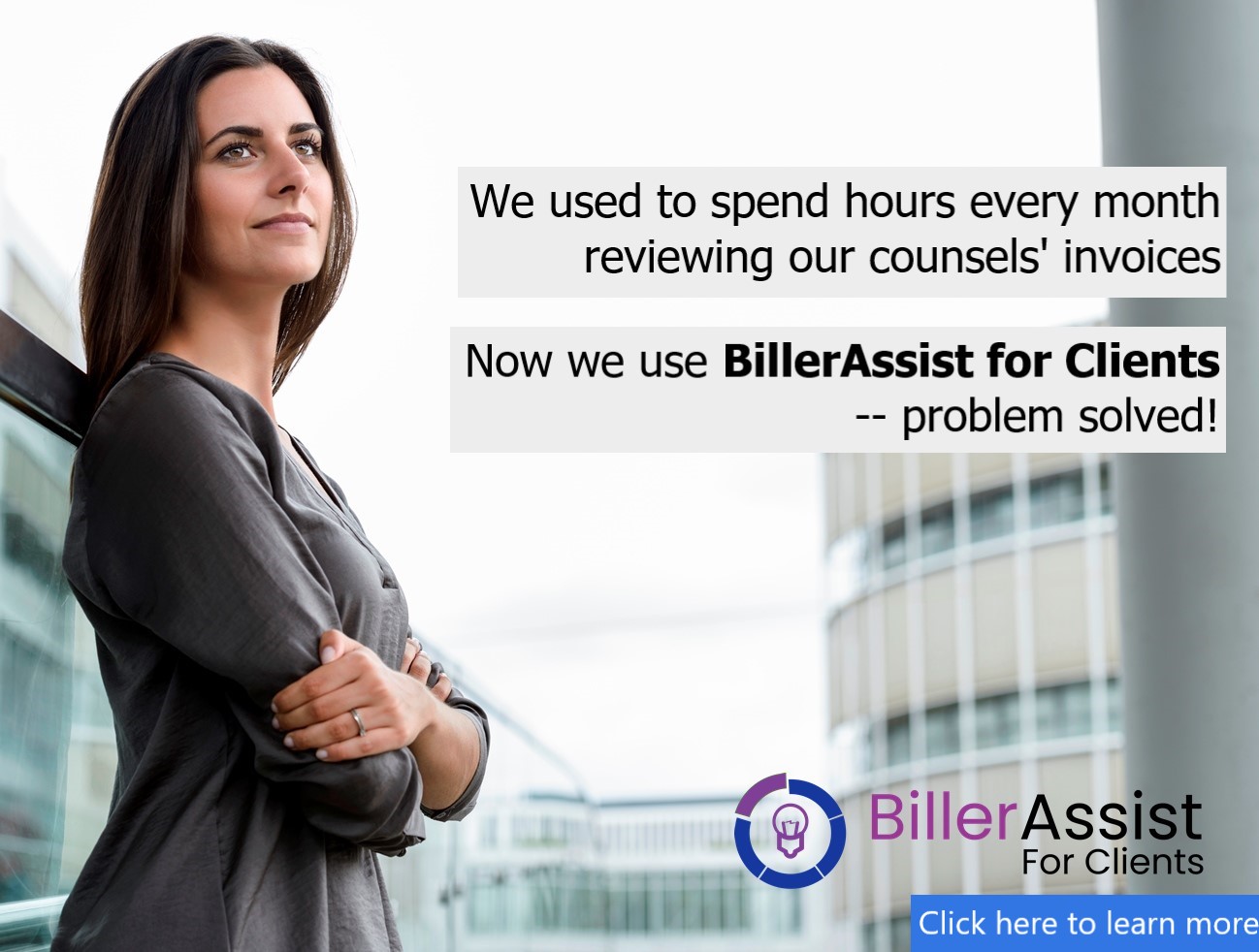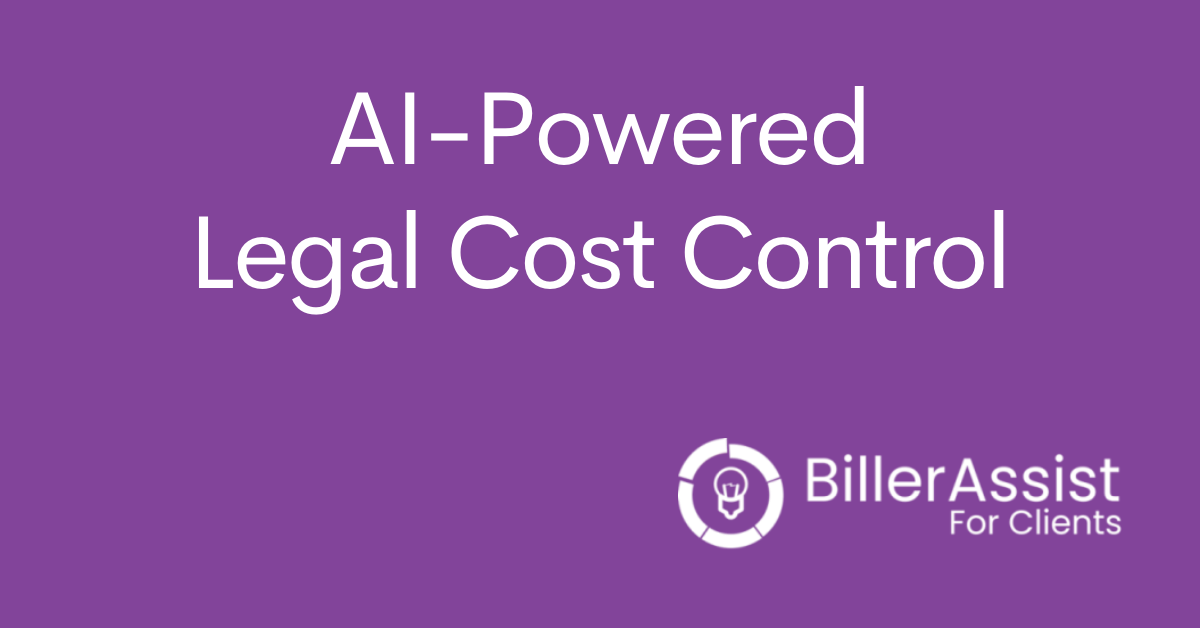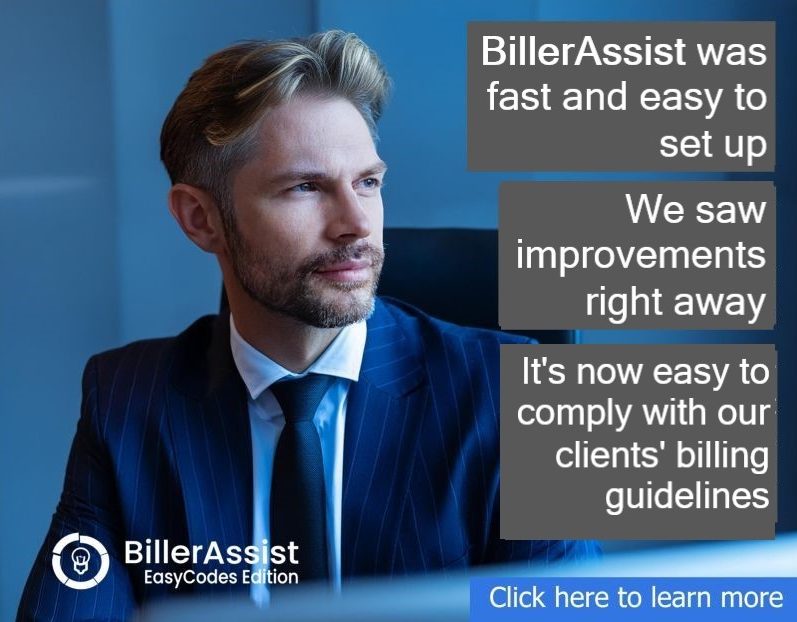What is “AI-Powered Legal Cost Control” and Why Is It Useful?
Enthusiasm around AI in the legal space is high. Numerous articles highlight the transformative impact of artificial intelligence (AI) on the legal profession, emphasizing improvements in speed, productivity, accuracy, as well as enhanced analytical and decision-making abilities.
Concerns regarding the ethical use of AI, and the return on investment of AI solutions, can be overcome. As such, the upside is significant, and corporate legal departments should promote the utilization of Artificial Intelligence (AI), both among outside counsel law firms and internally.
This article will specifically explore the emergence of innovative “AI-powered legal cost control” applications for corporate legal departments and the advantages these applications provide to both law firms and legal departments.
Why Use AI?
Promoting the use of AI in law firms can yield numerous advantages for corporate legal departments.
By utilizing AI-powered applications, law firms can optimize their processes, lower expenses, and improve the quality of their offerings. All of this ultimately results in enhanced outcomes for both the firms and their clients.
The same is true for internal usage of AI within corporate legal departments. The benefits and advantages of utilizing AI solutions in corporate legal departments are at least comparable – if not equally significant – as those in law firms.
- Productivity and Efficiency
Data entry, contract analysis, and document review are just a few of the time-consuming, repetitive processes that AI can automate. This increases productivity by enabling lawyers and paralegals to concentrate on more complicated and strategic issues.
AI, or instance, can swiftly examine and evaluate contracts, spotting important terms, possible risks, and discrepancies.
In addition, in the domain of due diligence, AI can automate the analysis of vast amounts of information, including financial accounts and contracts, highlighting any problems for human examination.
Another example is in the litigation discovery space. AI can effectively organize and analyze vast amounts of data sets and documents, finding pertinent information and cutting down on review time.
- Human Resource Allocation
Fewer human resources, such attorneys and paralegals, can manage higher workloads and complete wore tasks by utilizing AI solutions.
AI enables corporate legal departments and their outside counsel law firms to take on more work without requiring a corresponding increase in head count and other resources.
For corporate legal departments that could have changing legal needs, this is very helpful.
Additionally, AI can assist in identifying and assessing possible areas for personnel improvement, from performance reviews on an individual basis to more general process inefficiencies.
- Legal Fees and Expenses
The ability of AI to automate repetitive work is now widely recognized. AI lessens the amount of labor-intensive manual labor required to complete the same task by automating repetitive processes.
AI, for instance, can reduce the amount of time spent on preparing contracts by creating them based on templates and particular client requirements. As another example, AI can evaluate various document versions, emphasizing modifications and simplifying the process of spotting inconsistencies.
Even the drafting of legal documents – including letters and memoranda, as well as pleadings and motions in litigation – can be automated with AI.
All of these capabilities reduce internal operating costs for corporate legal departments and encourage lower legal fees from outside counsel law firms.
- Execution Time
AI is far more efficient than humans at processing information and completing tasks. Faster answers to legal questions, and shorter completion times for longer projects, are inevitable.
- Accuracy and Error Rates
AI can swiftly examine and highlight provisions in contracts and other legal documents, speeding up and improving the efficiency of the writing and analyzing process. This lessens mistakes and improves the accuracy and consistency of legal drafting.
- Legal Research and Analysis
AI can assist in identifying and evaluating possible areas of risk, enabling businesses to take precautions and steer clear of expensive legal issues.
Large numbers of statutes, rules, case law, and other materials can be analyzed by AI algorithms to find pertinent case law and highlight important provisions. Additionally, AI tools can recommend specific language and provisions based on precedent and applicable laws.
AI can also keep an eye on changes to regulations and notify legal staff of any possible compliance problems. Moreover, AI can also be used to assess the risks and likely outcomes of litigation by analyzing past case law and other data.
This enables legal professionals – in both law firms and legal departments — to give their clients better and faster advice.
- Client Communications and Responsiveness
AI can assist in responding to client inquiries more quickly and accurately.
For example, AI chatbots can save human resource time by answering client inquiries, providing information, and setting up appointments.
Similarly, AI facilitates easy and instantaneous client access to documents, status updates and reports, and real time billing information through secure client portals.
By using AI to handle simple tasks, legal professionals can more time on more intricate and nuanced legal work, while also improving client engagement and satisfaction.
- Competition and Compensation
In a market that is extremely competitive, law firms are acutely focused on obtaining and keeping clients. By providing cutting-edge services and solutions, law firms that use AI technologies can obtain a distinct advantage.
Similarly, corporate legal departments can use AI to increase their productivity and efficiency. The use of AI will result in better overall outcomes and higher compensation for the increased value of employees.
What About “AI-Powered Legal Cost Control”?
AI-powered legal cost control applications assist companies and law firms in controlling legal costs and minimizing billing errors. In essence, these apps optimize current billing and associated legal services by utilizing historical invoicing and other data.
The advantages that these AI-powered legal cost control apps provide include greatly improving the efficacy and efficiency of the content and provision of legal services.
Moreover, by utilizing a more cooperative approach to legal billing, some of these tools enable corporate legal departments to employ AI to automatically communicate billing expectations to their outside counsel.
These apps typically assist in-house personnel in working more effectively and efficiently with regard to legal invoices, rather than replacing the employees with machines that offer no human involvement.
- Automatically Flag Errors
Legal cost management apps with AI capabilities automatically review invoices for mistakes such as non-billable charges and expenses, duplicate entries, and improper coding.
The AI features also identify discrepancies in invoices by comparing them to Outside Counsel Billing Guidelines and similar service level billing agreements.
In order to find trends and spot irregularities, these technologies typically examine and incorporate past approved invoice data. This enables the AI to detect faults or even fraudulent activity by using statistical approaches to find outliers and departures from typical trends.
New invoices can be compared to previous billing data records using AI algorithms.
This allows the apps to spot anomalies in amounts, costs, or fees. Unusual costs, amounts, or other characteristics are clearly identified for more nuanced examination.
- Substantial Time Savings
Color codes or other clear identifiers are automatically applied to identify billing entries that are excessive, unreasonable, or otherwise non-compliant.
This allows AI-powered legal cost control applications to greatly reduce the time spent examining and approving invoices.
- Standardization of Billing Data
AI can reduce errors and save time by automating operations like coding billing entries, and enforcing task-based billing. The automation of these tasks provides standardization of billing data, which itself is a significant bonus.
Standardizing billing data is significantly beneficial to a corporate legal department.
Standardized data facilitates data-driven decision-making, which enables legal departments to prioritize certain types of expenditures and allocate resources efficiently.
Corporate legal departments can monitor and evaluate the performance of law firms and other legal service providers by using standardized data provided by the new AI-powered legal cost control systems.
The identification of opportunities for cost savings and process improvements involves using AI to compare billing and other data from one law firm or vendor to the equivalent data from internal and industry benchmarks.
Standardized billing data is actually a prerequisite for thorough analysis of legal services and related billing. Using uniform data makes it easier to find areas for budget optimization, cost improvements and reductions, and even the selection and tailoring of law firms and vendors to specific types of legal work.
- Ethical and Compliant Billing
AI can assist legal practices in meeting client billing standards and guaranteeing reasonable and ethical billing practices.
AI-powered legal cost control applications can be configured with particular rules and guidelines to look for typical mistakes like duplicative work, excessive research charges, or erroneous or invalid billing codes. This guarantees that all invoice charges are appropriate and in accordance with applicable requirements.
The fairness of the billing process can be enhanced by the new AI applications. Using machine learning models and previous data, AI can quickly spot any fraud or mistakes. AI-powered legal cost control apps can also learn from historical data and increase their accuracy over time.
Get “AI-Powered Legal Cost Control” Apps
There are several variations of “AI-powered legal cost control” applications, each with unique features and pricing structures.
Such applications include:
- BillerAssist for Clients
The BillerAssist for Clients application allows corporate legal departments to pre-screen invoices from law firms and other legal service providers, before the invoices are submitted.
The app works as an add-on to a company’s existing invoice management processes and systems, and does not require any change in systems.
BillerAssist for Clients automatically reviews legal invoices, and flags entries that are unreasonable or excessive, or that violate billing rule and guidelines configured by the corporate legal department subscriber.
Its unique collaborative features help outside counsel fix billing errors before invoices are submitted. This further decreases the time spent reviewing invoices, as all or most discrepancies are fixed before review by in-house personnel.
In addition, by providing real-time collaboration and communication of billing expectations, BillerAssist for Clients also helps eliminate billing disputes,
Its advanced machine learning trains the AI based on the company’s own approved billing records, and learns from new billing records as the app continues to be used.
For clients that want a full range of functionality, including invoice tracking and matter management capabilities, BillerAssist for Clients is also available as a complete standalone system.
- BillerAssist EasyCodes Edition
BillerAssist EasyCodes Edition is an AI-powered legal cost control application for law firms.
It works with a law firm’s existing billing system, and does not require any change of systems.
Like its client-facing counterpart, BillerAssist EasyCodes Edition automatically identifies common billing errors using color codes.
It also utilizes advanced machine learning to adapt the law firm’s specific needs, and to improve itself as the app continues to be used.
BillerAssist EasyCodes Edition automates the coding of billing entries, facilitating the standardization of billing data. For law firms that do not require billing codes in their invoicing, the app is also available in a simplified version called “BillerAssist”.
Conclusion
Corporate legal departments can easily increase productivity, efficiency, cost management, and strategic insights by implementing AI-powered legal cost control tools. This results in improved productivity and better decision-making.
Law firms also benefit more from these applications. By effectively and clearly communicating billing and other expense expectations, AI-powered legal cost control apps help to strengthen relationships with law firms by lowering the incidence of billing miscommunications and disagreements.
Thus, AI-powered legal cost control apps facilitate improved collaboration between in-house corporate legal departments and their outside law firms, resulting in a more fruitful and effective cooperation toward mutual goals.








